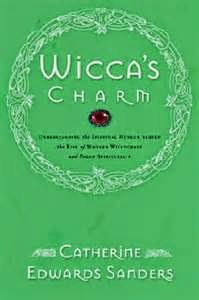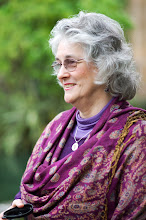One Saturday
when I was chatting with the Native American chaplain who sponsors our Wiccan
circle at San Quentin, he handed me a book.
He’d received it from the Jewish chaplain who’d been our previous
sponsor. Wicca’s Charm: Understanding the Spiritual Hunger Behind the Rise of
Modern Witchcraft and Pagan Spirituality, by Catherine Edwards Sanders. I said I was unfamiliar with the author and
had not heard anything about it, although I generally keep half an eye open for
newer Pagan publications.
He casually
mentioned that according to this book, and according to the chaplain who gave
it to him, ostensibly for the small library we keep in the Wiccan storage
locker along with our ritual supplies, Wicca was for women and had little
relevance here in an all-male prison.
Not that he thought that, but that the book made that case. He gave it to me to take home. Book slut that I am, I took it, thinking that
with all the reading material stacked around my house awaiting my attention, it
would be very low priority.
As I was
straightening up around the house today, I decided to make these stacks a
little shorter and try to find some shelf space for the books that were lower
priority on my reading list. I picked up this book and began to page through
it. First I noticed some underlining on
this text:
Ironically,
neo-Paganism appeals to people because it doesn’t seem to be very
commercialized. One Pagan woman told me,
“People are turning to Paganism for many reasons. The main ones are they are tried of the judgmental
hypocrisy of commercialized religions and want the freedom Paganism
gives.” But as we can see at the local
bookstore, on the Internet, or on our TV sets, Wiccan is far from
uncommercialized…
Then the
author goes on to mention Z Budapest’s kids camps that cost $325
…for
four days of horseback riding, archery, swimming, and canoeing, as well as
lessons in alchemy, the creating of their own magic tools, and identification of
magic rocks and crystals.
Well, I ask
you: where else can one find food, lodging, planned programs, and other
amenities for $325 for four days?
Regardless of who’s teaching what, at the very least it costs producers
money to rent facilities and feed people.
So I
thought, “Gee, she’s talking about us.
Or at least about people I’m likely to know.” So I scanned a few more pages, only to arrive
at one that said:
Much
like Christian preachers, neo-Pagans have joined the speaker’s [sic] circuit. M. Macha Nightmare [sic] offers two lectures, based on her book The Pagan Book of
Living and Dying, titled “Meeting Death and Grieving Loss” and “Healing
Ourselves and Healing Our Community.”
The cost for both talks is $75 to
$125 per person. [Emphasis mine.]…
Are you
kidding me? First of all, those two
titles the author references are to workshops, not lectures. I don’t lecture much. My strength, as anyone who’s ever attended
one of these presentations can attest, is in getting people to think about
topics that aren’t much discussed in daily conversation and get them talking.
More
importantly, however, is that I’ve never gotten even close to charging that
kind of money. I’ve occasionally arrived
for workshops when not one solitary soul showed up. Hardly commercially viable, plus empty houses
keep me humble.
Based on just
these few quotes, I know that the rest of the book cannot be accurate and
truthful. The book is a hit piece, pure
and simple.
I note in the
author’s minibio on the cover that she writes for The Washington Times,
so that should tell us how biased she is.
The Times is owned by News World Communications, an
international media conglomerate associated with the Unification Church. Rev. Sun Yung Moon says that the paper “is
responsible to let the American people know about God” and “will become the
instrument in spreading the truth about God to the world.” Need I say more?

